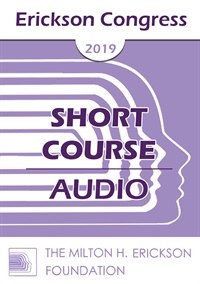
- Average Rating:
- Not yet rated
- Topic Areas:
- Short Courses | Art and Creativity | Attunement | Improvisation | Psychotherapy
- Categories:
- Erickson Congress | Erickson Congress 2019
- Faculty:
- Paul Leslie, Ed.D.
- Duration:
- 1 Hour 11 Minutes
- Format:
- Audio Only
- Original Program Date:
- Dec 12, 2019
- Short Description:
- In this training you will learn the factors which lead to creating alive and inspired therapy sessions regardless of theoretical orientation. Drawing from such diverse sources as indigenous wisdom traditions and modern psychotherapy approaches, this training will demonstrate how embracing improvisation and utilization can revitalize and energize therapy sessions.
- Price:
- $15.00 - Base Price
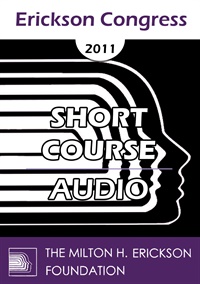
- Average Rating:
- Not yet rated
- Topic Areas:
- Short Courses | Improvisation | Abuse | Ericksonian Hypnosis and Therapy Techniques | Utilization
- Categories:
- Erickson Congress | Erickson Congress 2011
- Faculty:
- Claudia Weinspach, Dipl. Psych
- Duration:
- 1:31:39
- Format:
- Audio Only
- Original Program Date:
- Dec 09, 2011
- Short Description:
- The utilization of body work and improvisational theater can be employed for different therapeutic purposes. In a therapy group with sexually abused survivors, it is a useful tool in the tradition of Ericksonian therapy. Since sensory body work and improvisational theater elements are excellent tools to absorb the patients’ attention in an equally structured and playful way, they become actors and creators of their new body experience. This is an experiential workshop.
- Price:
- $15.00 - Base Price

- Average Rating:
- Not yet rated
- Topic Areas:
- Workshops | Improvisation | Therapist Development
- Categories:
- Erickson Congress | Erickson Congress 2011
- Faculty:
- Danie Beaulieu, PhD
- Duration:
- 59 Minutes
- Format:
- Audio Only
- Original Program Date:
- Dec 07, 2011
- Short Description:
- Are you and your clients in a rut? Need to break out of the routine and add fun, interest and efficacy to your sessions? Come see how simple props — paper, cups, blank videocassettes — can be imaginatively used to create an implicit language system that will enhance communication with your clients and generate more impact in every session. Multisensory techniques allow you to tap into the sensory modalities of your clients, going beyond just words to create change. You’ll learn the Mnemotechnique Principles that demonstrate how to stimulate normal functions of memory and imagination to increase your efficacy with every client.
- Price:
- $20.00 - Base Price
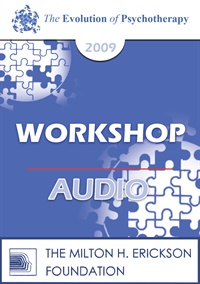
- Average Rating:
- Not yet rated
- Topic Areas:
- Workshops | Improvisation | Gestalt | Relationships | Storytelling | Psychotherapy
- Categories:
- Evolution of Psychotherapy | Evolution of Psychotherapy 2009
- Faculty:
- Erving Polster, PhD
- Duration:
- 2 Hours 48 Minutes
- Format:
- Audio Only
- Original Program Date:
- Dec 12, 2009
- Short Description:
- Dr. Polster will show how a deep relational duet can be created and, joined with therapeutic experiments and awareness expansion, provide a landscape of high focus, surprise, directionalism and radiance in the search for a sense of personal wholeness.Creation of fluidity, dependable identity, microcosmic lessons, and fresh storytelling will serve as major vehicles.
- Price:
- $15.00 - Base Price
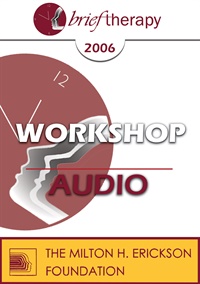
- Average Rating:
- Not yet rated
- Topic Areas:
- Workshops | Improvisation | Art and Creativity | Brief Therapy | Therapeutic Relationship
- Categories:
- Brief Therapy Conference | Brief Therapy Conference 2006
- Faculty:
- Matthew Selekman, MSW
- Duration:
- 2:26:49
- Format:
- Audio Only
- Original Program Date:
- Dec 09, 2006
- Short Description:
- Despite all the earnest efforts of researchers, therapy remains at least as much an art as a science. Seasoned practitioners know that when the therapeutic process becomes too cautious and mechanical, drained of risk and creativity, clinical effectiveness suffers. But how do we avoid being paralyzed by our clients' chronic difficulties and resistant clients? How can we step outside the box and bring more of our creative and playful selves to our work? This workshop will present several guidelines for developing a creative partnership with clients that taps both therapist and client inventiveness. Through the use of videotape examples and skill-building exercises, participants will discover their own signature strengths as therapists and how best to mobilize them in session. We will discover how to use humor, stories, drama and imaginative family play and art experiments to create a therapeutic climate ripe for change in your clinical practices.
- Price:
- $15.00 - Base Price
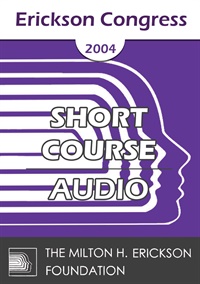
- Average Rating:
- Not yet rated
- Topic Areas:
- Short Courses | Improvisation | Utilization | Solution Oriented Approach | Communication | Therapist Development | Trance
- Categories:
- Erickson Congress | Erickson Congress 2004
- Faculty:
- Claudia Weinspach, Dipl. Psych
- Duration:
- 1:19:42
- Format:
- Audio Only
- Original Program Date:
- Dec 02, 2004
- Short Description:
- Improvisational theater is a useful component in brief therapeutic approaches. It can be used for different therapeutic purposes. One important goal to be achieved is the patient's development of a healthier body perception as well as their natural recognition and expression of sensual feelings. In this context, the use of improvisational theater elements helps to connect with forgotten or hidden resources of abused women with multiple trauma symptoms. By absorbing the patient's unconscious mind in a state of creative, sensual energy the patient's potential is utilized and can serve as a powerful catalyst to energize their own healing resources.
- Price:
- $15.00 - Base Price
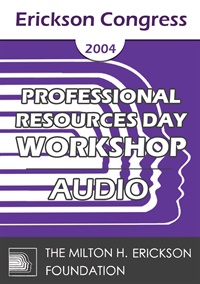
- Average Rating:
- Not yet rated
- Topic Areas:
- Workshops | Improvisation | Therapist Development | Art and Creativity
- Categories:
- Erickson Congress | Erickson Congress 2004
- Faculty:
- Robert Schwarz, PsyD
- Duration:
- 1:32:01
- Format:
- Audio Only
- Original Program Date:
- Dec 01, 2004
- Short Description:
- Increase your ability to improvise and think creatively on the spot. Rejuvenate your ability to find the humor and imaginative spark in all types of situations. In this almost totally FUN and experiential workshop participants will learn a variety of exercises from improvisational comedy and acting that will stimulate their own consciousness of inventiveness. A great way to supercharge yourself for the rest of the Congress.
- Price:
- $15.00 - Base Price

